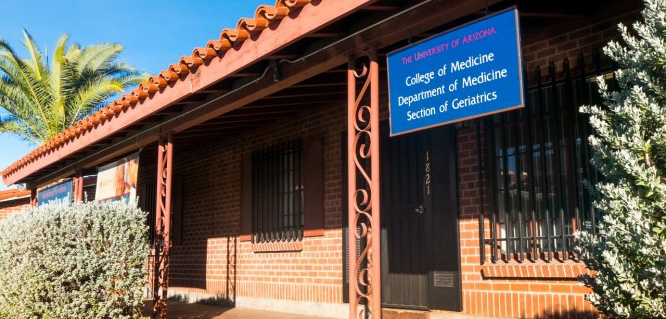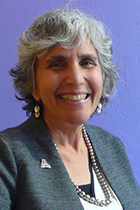 By Robin Tricoles | University Communications
By Robin Tricoles | University Communications
 Mindy Fain, MD, cares for older patients – some at the end of life, some who are going strong. Fain, who arrived at the University of Arizona more than 30 years ago, is chief of the Division of Geriatrics, General Internal Medicine and Palliative Medicine at the College of Medicine – Tucson. She also holds the Anne and Alden Hart Endowed Chair in Medicine and is co-director of the UA Center on Aging.
Mindy Fain, MD, cares for older patients – some at the end of life, some who are going strong. Fain, who arrived at the University of Arizona more than 30 years ago, is chief of the Division of Geriatrics, General Internal Medicine and Palliative Medicine at the College of Medicine – Tucson. She also holds the Anne and Alden Hart Endowed Chair in Medicine and is co-director of the UA Center on Aging.
Through a combination of education and training, research, clinical care and community engagement, the center helps older people live long, healthy, fulfilling lives. The center recently was recognized as a center of excellence in home-based primary care by the Home Centered Care Institute, a nonprofit organization.
 Lo Que Pasa talked with Fain about geriatric medicine; the specialty's under-recognized and often misunderstood syndrome, frailty; and how the frailest of the frail may be able to get quality health care.
Lo Que Pasa talked with Fain about geriatric medicine; the specialty's under-recognized and often misunderstood syndrome, frailty; and how the frailest of the frail may be able to get quality health care.
What are your main areas of interest when it comes to geriatric medicine?
There's a syndrome called frailty, and it's been my focus since it was first recognized over 15 years ago. The syndrome is incredibly important, but the community doesn't know about it. If we think about a frailty-resilience spectrum, resilience means you bounce back, you recover quickly, you maintain health and wellness. Frailty is the other side. It suffers from a name that most people think they understand. So, if I say "frailty," you might say, "I know what that is. It's that little old lady walking down the street with a cane." But that's not really what it is.
Frailty is a syndrome of restricted physiological reserves, the inability to respond to stressors, and the inability to bounce back. It's a vague definition, an awfully vague definition, just like Alzheimer's was a vague definition when I was in medical school. People would define Alzheimer's as poor memory. But it was a common word, and a lot of people had poor memory. We just didn't know what normal changes in aging and cognition were. So, frailty suffers from not only being a term people think they understand, but one that – despite a lot of research – doesn't have depth to it yet.
Really, it is this restricted ability to respond to stress, and it is associated with incredibly poor health outcomes, like morbidity, institutionalization, and death. Frailty is the strongest predictor of poor health. It's better than age. About 20 percent of people over the age of 80 are frail or pre-frail. Unfortunately, we don't yet have much to offer except the general caveats of how to age well: Keep physically active, keep cognitively active, keep socially and spiritually connected, and eat colors.
You mentioned that one of your two passions is to identify who is frail. Given that we don't yet have a way to reverse frailty, why is this important?
We want to identify who is frail for two reasons. One is so we don't throw stressors at people that they will have a hard time recovering from, like elective surgery. On the other hand, if we simply look at someone, ageism may kick in. That is, we may think they're frail but they're not. So, we may restrict what we offer – what would be good health care for them – because we're making a decision based on a lot of things, some not based on evidence. Second, if we can identify people who are frail, we might be able to figure out what to do to help make them stronger and more resilient.
What are some of your other passion?
My other passion has to do with home-based medical care, which is commonly thought of as house calls. My focus has always been on home- and community-based medical and social care, providing team-based primary care in the home of seriously ill, older adults who also have functional problems. These patients are the 5 percent of Medicare patients who account for 50 percent of the cost. If they were costing a lot and getting great care, that would be an ethical issue. But the high cost is there because the system wasn't developed to provide care for them, and the care they get is fragmented.
Think about the person who is housebound. They have many medical conditions. They're on 15 to 20 medications, and it's hard for them to get around. It's hard for them to get to the doctor. And even if they get to their primary care visit, the 20 or 30 minutes is not enough to even begin to understand what is important to them – or to begin to understand what is going on, and give them what they need. They may have many visits to specialists, who don't talk with one another. They end up using the emergency room and hospital as their primary care. So, the system fails them.
My goal is to expand home-based primary care in the community. It's a struggle because our fee-for-service model doesn't pay for it. But we have the evidence that home-based primary care on a national level saves money and improves care. The Department of Veterans Affairs has been leader in this team model of care for 30 years. But home-based primary care isn't known by a lot of people, and there's not a workforce for it yet.
Team-based primary care in the home is a very expensive program if we don't serve the right people. They have to be functionally impaired, or disabled, and seriously ill. But if you keep people at home rather than institutionalized, their quality of life is improved, and it saves money. It saves about 20 percent off the Medicare bill. So, it's a win-win. You get a higher quality care and lower costs for the people, and their families, who are suffering most.
It sounds like you have a full schedule. When you get the chance, what do you do for relaxation?
I'm a grandma. I have three great adult children who live here in Tucson. I've lived here forever. My children all went away to college and came back, and now I have three delicious grandchildren. I have a 4-year-old and an 8-year-old from my son, David, and my daughter-in-law, Leah. And I have a 9-week-old grandson from my daughter, Becca, and my son-in-law, Nate. Last Halloween, I didn't dress up, but I was handing out candy while my older grandkids wanted to go trick-or-treating. So, I sat at their house and handed out candy. A little girl came up to the door, and she was so sweet, and I complimented her outfit because she really looked great. I was dressed up as nothing, so she said to me, "What are you dressed up as?" And I said, "A grandma." And she looked at me and said, "Good job! Great outfit!" So, that's what I do. I relax by grandparenting. That's what gives me the joy in my life.
ALSO SEE:
"UA@Work Focuses on Dr. Nancy Sweitzer’s Efforts to Open Minds, Mend Hearts" | Posted Aug. 16, 2017
“UA Center on Aging Joins Nationwide Network For Home-based Primary Care Education” | Posted Aug. 4, 2017
“Commonwealth Fund Report on Home-Based Primary Care Quotes Dr. Mindy Fain” | Posted June 19, 2017
“Arthritis Pain Management Lecturer Interview Featured in UA@Work Newsletter” | Posted April 20, 2017

